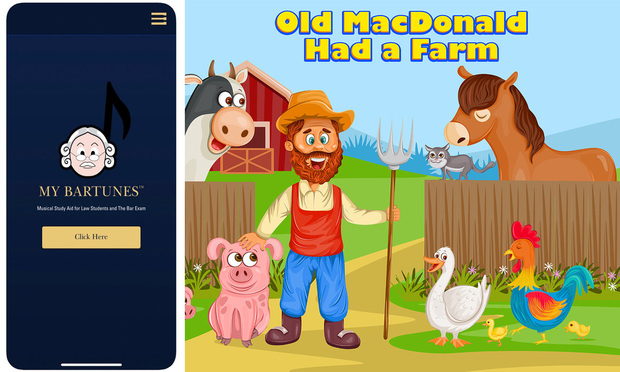'Old MacDonald’ Had A Tort Claim: NY Judge Remixes Nursery Rhymes for Bar Prep
At 53, New York City Civil Court Judge Josh Hanshaft may call himself “old school,” but his app My BarTunes takes a decidedly new-school approach to memorizing core legal concepts.
August 14, 2019 at 03:18 PM
3 minute read
The original version of this story was published on Legal Tech News
 MyBarTunes.
MyBarTunes.
In a bid to enhance legal education, one New York City judge has made the move from the bench to the App Store. New York City Civil Court Judge Josh Hanshaft recently developed and launched My BarTunes, an app that pairs core law school subjects to age-old nursery rhymes to assist law students studying for the bar exam.
My BarTunes focuses on legal concepts taught in first-year law schools’ evidence, contracts, constitutional law, real property, civil procedure, criminal law and torts courses, and matches them to the melodies of nursery rhymes including “Three Blind Mice” and “The Farmer in the Dell.” Hanshaft said he combined his love of music and 20-plus years as an attorney and judge to help address the intense preparation needed to pass the bar exam and common first year-law school courses.
“It’s so much material when you are a first-year law student or taking the bar that every way to prepare is very important for law school students,” Hanshaft explained.
Although a developer coded the app, it took roughly seven years to create the content for My BarTunes, with Hanshaft working primarily on relearning all of the subjects and creating melodies.
“The process was basically: learn all the subjects, boil it down to what is necessary to know about the subject, find the song and put the words to lyrics that go with the song and then make sure everything rhymes and makes sense and review it,” he explained.
Hanshaft released his app without a background in technology. While he has no plans to release more apps, he said it’s becoming imperative that judges have some understanding of technology when making judgments in a high-stakes environment.
“Criminal Court judges are signing warrants all the time,” he said. “If you don’t understand the technology, how can I sign a warrant about a crime that was committed or information involved in searching those materials unless I understand what that material is? You have to [understand it], you really don’t have a choice.”
Hanshaft noted that although older judges nearing retirement aren’t placing an emphasis on leverage technology, more court system are adopting new software to help streamline tasks.
“You need to see what a judge did six [court] appearances ago and following the history of a case is much easier when it’s automated,” he said. “There are many different areas that frees up other people who are processing paperwork. They don’t have to do that as much because they can look on the computer and find it easier as opposed to having buckets of paperwork to find what they need.”
Hanshaft said he expects more courtrooms to adopt technology to match the expectations of the incoming younger generations of lawyers. In the meantime, as courtrooms wait for tech resources, cases before judges are focusing more and more on modern technology.
“There’s a lot of crime that has to do with computers and identity fraud, and cooking the books is now more technical,” he added. “Judges have to be aware and up on technology.”
This content has been archived. It is available through our partners, LexisNexis® and Bloomberg Law.
To view this content, please continue to their sites.
Not a Lexis Subscriber?
Subscribe Now
Not a Bloomberg Law Subscriber?
Subscribe Now
NOT FOR REPRINT
© 2025 ALM Global, LLC, All Rights Reserved. Request academic re-use from www.copyright.com. All other uses, submit a request to [email protected]. For more information visit Asset & Logo Licensing.
You Might Like
View All
Class Certification, Cash-Sweep Cases Among Securities Litigation Trends to Watch in 2025
6 minute read
Health Care Data Breach Class Actions Saw December Surge in NY Courts

AI Startup Founder Defrauded Investors of Millions, US Prosecutors Say
3 minute read
Legal Leaders See AI's Multitude of Uses as Both Blessing and Curse
Trending Stories
Who Got The Work
J. Brugh Lower of Gibbons has entered an appearance for industrial equipment supplier Devco Corporation in a pending trademark infringement lawsuit. The suit, accusing the defendant of selling knock-off Graco products, was filed Dec. 18 in New Jersey District Court by Rivkin Radler on behalf of Graco Inc. and Graco Minnesota. The case, assigned to U.S. District Judge Zahid N. Quraishi, is 3:24-cv-11294, Graco Inc. et al v. Devco Corporation.
Who Got The Work
Rebecca Maller-Stein and Kent A. Yalowitz of Arnold & Porter Kaye Scholer have entered their appearances for Hanaco Venture Capital and its executives, Lior Prosor and David Frankel, in a pending securities lawsuit. The action, filed on Dec. 24 in New York Southern District Court by Zell, Aron & Co. on behalf of Goldeneye Advisors, accuses the defendants of negligently and fraudulently managing the plaintiff's $1 million investment. The case, assigned to U.S. District Judge Vernon S. Broderick, is 1:24-cv-09918, Goldeneye Advisors, LLC v. Hanaco Venture Capital, Ltd. et al.
Who Got The Work
Attorneys from A&O Shearman has stepped in as defense counsel for Toronto-Dominion Bank and other defendants in a pending securities class action. The suit, filed Dec. 11 in New York Southern District Court by Bleichmar Fonti & Auld, accuses the defendants of concealing the bank's 'pervasive' deficiencies in regards to its compliance with the Bank Secrecy Act and the quality of its anti-money laundering controls. The case, assigned to U.S. District Judge Arun Subramanian, is 1:24-cv-09445, Gonzalez v. The Toronto-Dominion Bank et al.
Who Got The Work
Crown Castle International, a Pennsylvania company providing shared communications infrastructure, has turned to Luke D. Wolf of Gordon Rees Scully Mansukhani to fend off a pending breach-of-contract lawsuit. The court action, filed Nov. 25 in Michigan Eastern District Court by Hooper Hathaway PC on behalf of The Town Residences LLC, accuses Crown Castle of failing to transfer approximately $30,000 in utility payments from T-Mobile in breach of a roof-top lease and assignment agreement. The case, assigned to U.S. District Judge Susan K. Declercq, is 2:24-cv-13131, The Town Residences LLC v. T-Mobile US, Inc. et al.
Who Got The Work
Wilfred P. Coronato and Daniel M. Schwartz of McCarter & English have stepped in as defense counsel to Electrolux Home Products Inc. in a pending product liability lawsuit. The court action, filed Nov. 26 in New York Eastern District Court by Poulos Lopiccolo PC and Nagel Rice LLP on behalf of David Stern, alleges that the defendant's refrigerators’ drawers and shelving repeatedly break and fall apart within months after purchase. The case, assigned to U.S. District Judge Joan M. Azrack, is 2:24-cv-08204, Stern v. Electrolux Home Products, Inc.
Featured Firms
Law Offices of Gary Martin Hays & Associates, P.C.
(470) 294-1674
Law Offices of Mark E. Salomone
(857) 444-6468
Smith & Hassler
(713) 739-1250






